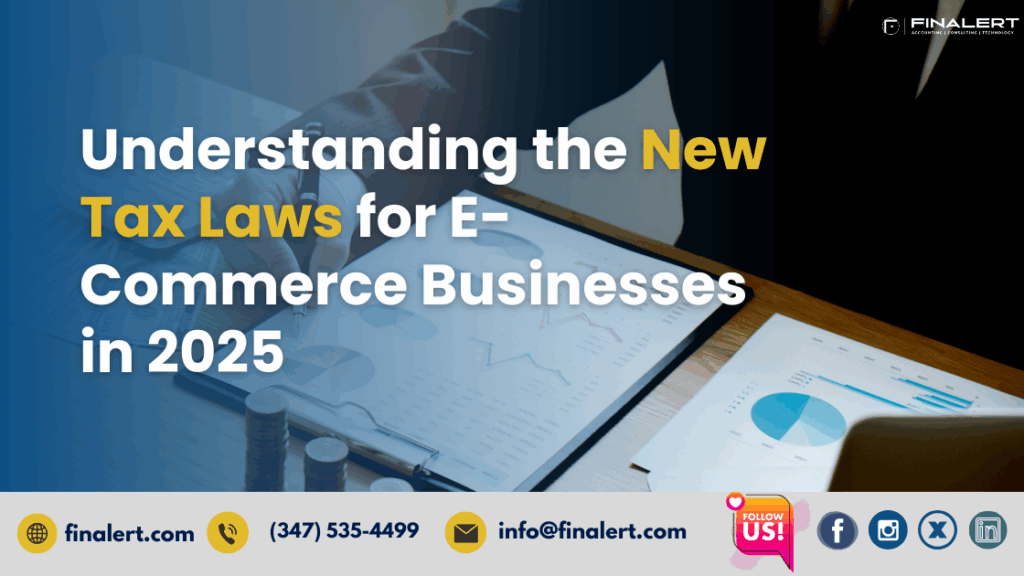
The dynamic world of e-commerce continues to flourish, presenting endless opportunities for businesses of all sizes. However, with this growth comes the complexity of navigating an evolving tax landscape. In 2025, new tax laws are poised to significantly impact e-commerce businesses, reshaping compliance and operational strategies. For business owners, staying ahead of these regulations is critical to ensuring profitability and avoiding penalties.
Finalert, with its deep expertise in accounting, consulting, and technology services, helps e-commerce businesses tackle these complexities. By offering tailored solutions, Finalert empowers companies to navigate tax challenges seamlessly, driving sustained growth and operational efficiency.

The new tax laws in 2025 bring several challenges for e-commerce entrepreneurs. These challenges stem from regulatory changes, increasing digital footprints, and cross-border operations.
As e-commerce expands, businesses increasingly find themselves operating in multiple states. With varied state-specific tax requirements, understanding and managing compliance becomes daunting. The introduction of stricter nexus rules means even small sellers may need to collect and remit taxes in states where they have no physical presence.
Governments worldwide are ramping up efforts to tax digital services and goods. E-commerce businesses must stay informed about VAT (Value Added Tax), digital services taxes, and country-specific regulations. Ensuring that your tax system accurately tracks and applies these taxes is crucial to avoiding compliance risks.
Selling to customers across borders comes with unique tax challenges. From import duties to differing VAT thresholds, businesses must ensure proper taxation without overburdening customers or absorbing unnecessary costs.
Mitigating the risks associated with new tax laws starts with adopting a proactive, strategic approach.
Integrating sophisticated tax calculation software can simplify compliance. These tools automatically update rates, manage nexus changes, and generate detailed reports. Finalert helps businesses implement tailored software solutions that fit their operational needs, ensuring compliance while reducing manual workloads.
A proactive audit process can identify gaps in your tax compliance strategy before regulators do. Partnering with experts like Finalert ensures that your audit is comprehensive, addressing both state-specific and international tax concerns.
Tax regulations are ever-evolving. Equipping your team with knowledge through regular training ensures they remain updated on the latest laws. Finalert provides workshops and consultation services to bridge the knowledge gap for e-commerce businesses.
Taxation trends in e-commerce point towards increasing complexity. Here’s what to watch:

Governments are broadening tax definitions to include new forms of digital services. E-commerce businesses offering downloadable products, subscriptions, or SaaS must remain vigilant about these changes.
Tax authorities are increasingly leveraging AI to detect compliance gaps. For businesses, adopting AI-driven tax management tools ensures accuracy and prevents costly errors. Finalert is at the forefront of helping clients incorporate such cutting-edge solutions into their workflows.
Cross-border tax treaties are becoming more robust, reducing loopholes for tax avoidance. Businesses must navigate these agreements to optimize tax payments.
Implementing these strategies not only ensures compliance but also brings several tangible benefits:
An online apparel store operating in 20 states faced challenges meeting multi-state tax obligations. By partnering with Finalert, the retailer implemented automated tax management software and conducted a thorough compliance audit. As a result, the company reduced compliance errors by 40%, avoided penalties, and reallocated resources toward customer experience enhancements.
Understanding and adapting to the new tax laws for e-commerce businesses in 2025 is essential for sustained success. By leveraging the right tools, staying informed, and seeking expert guidance, e-commerce businesses can overcome tax challenges with confidence. Finalert’s deep expertise in accounting, consulting, and technology positions it as the ideal partner to navigate this complex landscape.
To discuss how Finalert can help your e-commerce business thrive under the new tax laws, contact us at +1 347-535-4499 today.
Similar Articles
No results available
Get in touch with Finalert today for tailored business solutions!
No results available
Ready to thrive? Connect with Finalert today and let’s succeed together in the dynamic global market.
© 2025 Finalert. All rights reserved.
Ready to grow with confidence and clarity?
Finalert delivers high-quality accounting, financial advisory, and analytics services tailored to growing businesses providing control, visibility, and decision-ready insight to support sustainable success.
Address
Our Services
Accounting Services
Advisory Services
Industries
Quick Links
© 2026 Finalert® LLC. All Rights Reserved.